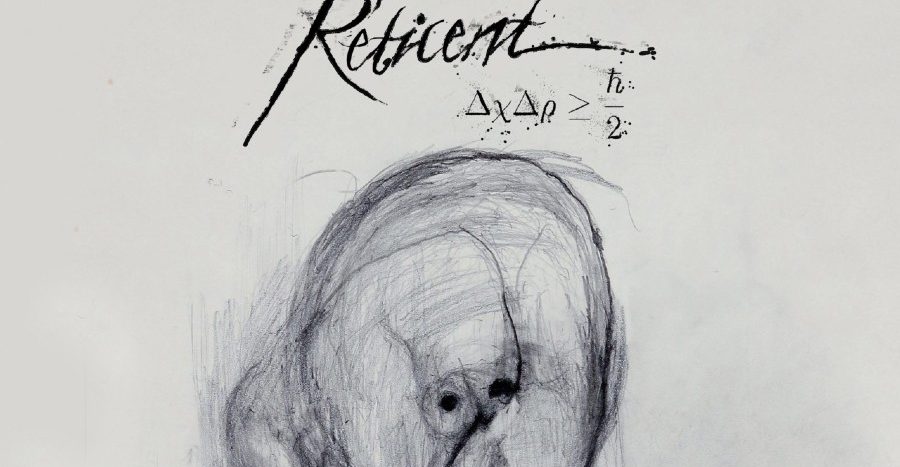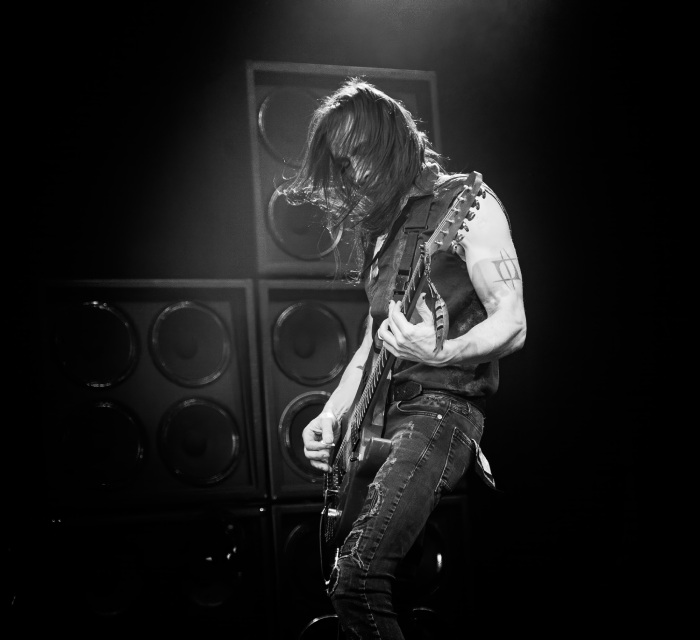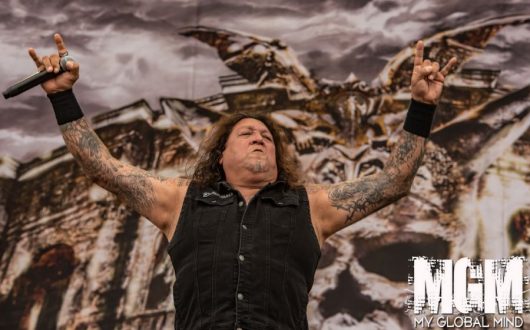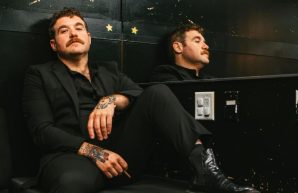All Words by:
DFITZ “Trash Witch”
The Reticent from Charlotte, NC just dropped melodic progressive metal album The Oubliette. It is an absolute masterpiece bringing awareness to dementia and Alzheimer’s. On the opening track of our journey through Chris Hathcock’s character’s eyes, we have “Stage One: Henry”.
We are greeted with an immediate voice sampling of a woman who is implied to be someone living in the nursing home that is the setting of The Reticent’s album “The Oubliette”. This character has lived in the nursing home for a while, in a later stage of mental decline, and is introduced to “Henry” who has just arrived.
He has yet to realize that he has been placed in the home to stay until his passing. Unfortunately this is a harsh reality, as articulated by this album about the healthcare system, and what it lacks for those that are mental health care patients that do not have families that can care for them in a society that makes it nearly impossible to do so.
“Henry” representing billions of patients across the world.
At ProgPower XXII, the band received a standing ovation from a seated audience and it’s reported by Metal Injection that not a single audience member had a dry eye.
Chris Hathcock’s lyricism, and his construction of his album as a whole, is absolutely genius. To reiterate on that, all track names presented in the form of the stages of dementia with a poetic nod to where “Henry” is at on his end of life journey. He penned the album in honor of a family member who was lost due to the disease. At the end of each set the band presents facts and statistics at the end of their sets to raise further awareness, an experience providing closure for many.
Dementia has seven stages, which are as follows:
- Stage 1: No cognitive impairment.
- Stage 2: Very mild cognitive decline.
- Stage 3: Mild cognitive decline.
- Stage 4: Moderate cognitive decline.
- Stage 5: Moderately severe cognitive decline.
- Stage 6: Severe cognitive decline.
- Stage 7: Very severe cognitive decline.
“I created The Oubliette for the same reason I created On The Eve Of A Goodbye – because I felt I had to. Having seen first hand what Alzheimer’s can do to a loved one – its cruelty, its indifference, its unstoppable tide – it compelled me to want to shed light on aspects of the disease and the horrors of watching it that I personally felt had not be all that explored musically, particularly in the niche genre of metal. Thus, I wanted to create something that would take the listener through the journey. Alzheimer’s is not just losing one’s memories. That is merely the beginning. Soon, other faculties are eaten away. Alzheimer’s patients lose their ability to form new memories, then they lose their ability to move, their ability to speak, their ability to eat, their ability to breathe. When seen through to its 7th and final stage, Alzheimer’s leaves its victims as a husk with no means to communicate nor memories to comfort. It is a nightmare that few of us could ever fathom. I wanted to create a narrative that followed someone through those stages. I based it off of my great uncle but renamed him Henry. It withered him down to nothing. He couldn’t remember his wife was dead. He was afraid, confused, and suffering. It was a heartbreaking thing to witness. Being the mediocre musician I am, I attempted to tell that story from various angles.
I titled it The Oubliette because it is a prison you are dropped in from the ceiling so there is presumably no way out. That’s what Alzheimer’s is. They are trapped in their minds disconnected from memories and who they are, but they are also trapped in their bodies unable to move, trapped in a bed, trapped in a room, trapped in a place. A prison inside a prison inside a prison. Hence, The Oubliette.”
- Chris Hathcock on the creation of The Oubliette, direct quote, humbly put.
Without further adieu, here in an in-depth look at the album as a whole.
Stage 1: His Name Is Henry
In response to the previously mentioned character opening in apology, Henry says “What have you forgotten?”.
Here is where we enter Stage One.
Dementia presents itself in 7 stages, a decline that ends in death. The Oubliette is also presented to us in 7 stages for this very reason.
“No one comes around anymore
He is the furthest thing from their mind
Henry thinks that he is coming home
Abandoned here, and here he’ll stay
As kind as a man can be
Discarded with hardly a word
He doesn’t know yet
His whole world is gone”
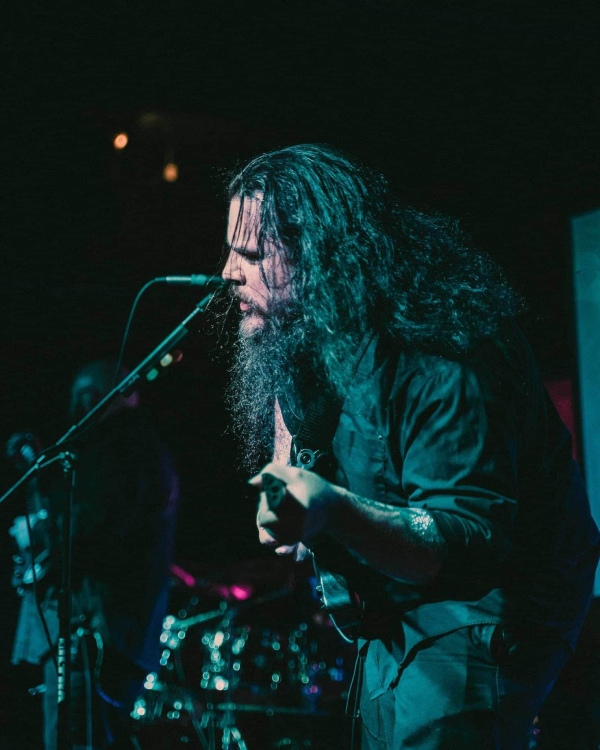
Photo Credit: Frank Hamilton
Stage 2: The Captive
“Henry, it’s time to go back in your room…
Let’s go. Let’s go!”
We are then introduced to the sound of a marching snare.
Track two of this release highlights mild cognitive decline stage of dementia. The breakdown is heartbreaking. The lyricism is also in regards to Chris Hathcock’s character, Henry, realizing he has been abandoned in the system.
“Who would leave me here, this must be a mistake, who would leave me here alone?”
To further reiterate, it is a harsh reality for billions across the world to see the end of their days in a nursing home or mental health facility. Chris Hathcock has done a phenomenal job of painting the picture of said harsh reality in his lyrical prose.
“They try to tell me this was my home
Malefactor they must think me to be
Get out! Let me go!”
Link to The Reticent’s
“Stage 2: The Captive”
https://youtu.be/O-hBxTJwqS4?
Stage 3: The Palliative Breath
In a documentary style timbre we hear a nurse solemnly speaking in a smoky voice.“Henry has dementia and he needs total assistance with all his activities of daily living”
Once again Chris Hathcock is phenomenal about setting a scene.
This is a beautiful ballad articulating the spiral of Henry’s declining memory, with lyricism that continually increases in emotional depth and clarity to prepare us for the climax that is the end of the album.
“Boy was confused, called me ‘Dad’ left in falling tears”
Stage 4: The Dream
“There must be going through his mind, why me?
…”
“Stage 4: The Dream” is another haunting display from The Reticent, with ethereal vocals from Chris Hathcock. It features a phenomenal jazz-funk fusion solo encapsulating The Dream as articulated to us thus far. It is of longing for the past and a different fate in the future, and for memories lost and for more memories to be made.
“Remember who you are”
Stage 5: The Nightmare
We are given a cinematic introduction to the track once again, as expected by The Reticent. Chris Hathcock’s usage of noise amidst symphonic metal elements brings a certain je ne sais quoi to the album that is indescribably haunting. By Stage 5 we have entered into a rapid decline stage, nearing full rapid decline- and the album is peaking in nightmare fuel, encapsulating Stage 5: The Nightmare.
Hathcock’s vocals are of pure contrasting darkness and light.
Stage 5: The Nightmare of a melodic progressive hardcore track done correctly, as is the entirety of the album as a whole. He gives us a look into how evil Alzheimer’s is to the body and mind, and how the longing for release is overwhelming to some.
“Progressive metal provided me with the greatest amount of freedom to explore these concepts I suppose. I never actually set out to make progressive metal. I’m not any kind of aficionado on the genre. I just write what speaks to me and what captures the feeling I am aiming to achieve. Sometimes I get it and sometimes I don’t. As the worst marketer and promoter in the history of the music business, I never knew how to sell anything I was writing nor what to call it. It’s not wildly unique or original, I just didn’t know. Progressive metal appears to be the most forgiving title but even within that genre I don’t know that The Reticent really fits in. Metal music in general has always spoken to me and connected with me. Its aggression resonates deeply in me but also the complexity inherent in the genre as a base allows for one to go beyond a four-chord song and explore. The progressive subgenre moniker seems to be even more forgiving of me incorporating jazz, symphonic, latin, acoustic, black, death, rock, etc. elements into one whole. In truth, The Reticent is probably a poor representative of the genre but I hope it could be a representative of what we can do with emotionally driven conceptual songwriting. If we are not bound by certain criteria of genres, then we are bound only to what the song needs at any given time. That’s what I’m into.”
-Chris Hathcock on what got him into progressive metal, as well as other genre influences we hear in The Oubliette.

Photo Credit: Alter Ego Images
Stage 6: The Oubliette
Weeping, a woman states tearfully, “He’s locked, locked inside himself. Probably going have to stop.”
A doctor replies, “Can I just ask you one question? What do you want to happen to him now?” She responds, “I want it all to be over as quickly as possible… and with the least pain and anguish for him”
The Reticent’s album titled track is hauntingly beautiful, terrifyingly jarring, and one of the most perfect lead to a resolution of an album we have heard.
Stage 7: ___
Flatlining and ascending into a higher realm, “Henry” has found serenity in the closing track of The Reticent’s masterpiece The Oubliette.
“I am a damaged person. I struggle every single day and am at constant war in my mind. I write the music I write because I feel I have to not because I want to. It keeps me going, it allows the steam to be vented, and keeps me from drowning completely. The pain people hear in my music is my own. And it is real. That will be drawn into further focus on the two new albums I’m working – for better or for worse. Processing the loss of the most important in my life as well as living with my disorders made for honest music. I’m sure everyone will hate it as it isn’t as refined as The Oubliette was but it was written in the grip of what I felt. It is as honest as I can make my mediocre output. So my life experience continues to be the chief influence on me. I write until something says what I need it to to help me. Then that becomes the song.”
- Chris Hathcock on inspiration for songwriting
With elements similar to Tool, Between The Buried & Me, The Mars Volta, and more prog-metal greats; Chris Hathcock, Nic Giordano, Cliff Stankiewicz, and James Nelson crafted a gift of an album that will last. They are as much musicians and performers, as they are teachers and performance artists. The Oubliette is a therapeutic experience for the senses, in eclectic time signatures with visual elements that is absolutely heart shattering, ground breaking, and wave-making.
The Oubliette is masterfully done, and was mixed perfectly by Chris Hathcock who wrote all the parts for all instruments for this album as well. Chris Hathcock is the vocalist and lead touring guitarist for his project The Reticent.
The Reticent is currently touring with drummer Nic Giordano, bassist Cliff Stankiewics, and guitarist James Nelson.
Score: 10/10
Reviewed by: DFITZ “Trash Witch”
